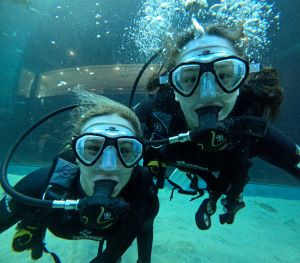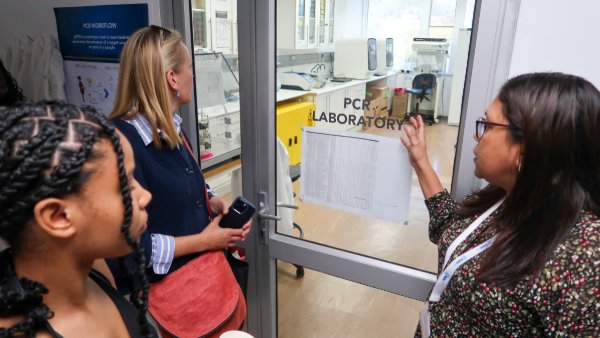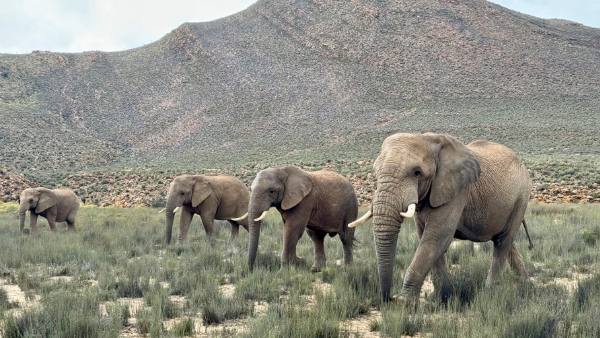The lipoma was larger than expected.
As Chanell Marthinussen, M.D., quickly reacted to the size of her patient’s benign fatty tumor, Amy Ndoye ’25 felt a rise in nerves as she watched the South African doctor. Marthinussen nimbly administered more anesthesia and expanded the incision — all while reassuring her patient who would remain awake throughout the three-hour long surgery. Marthinussen’s swift response and ingenuity didn’t end there. When gauze ran out during the surgery, she made use of other absorbent materials within the room.
Glancing around, Ndoye took note of the compact space. The room was just big enough for a hospital bed, desk, table for surgical instruments, a doctor, patient, and six Bryant students — all of whom carefully watched the meticulous work taking place in front of them and handed Marthinussen the tools she needed throughout the surgery.
“Watching this surgery emphasized how adaptive you have to be in the healthcare field,” says Ndoye, a Biology major who plans on becoming a physician assistant.

The experiential learning opportunity at Innohealth Medical Centres in Cape Town, South Africa, was part of Bryant University’s “Global Health Challenges” course, an offering within the School of Health and Behavioral Sciences. Students spent the spring semester exploring the health complexities facing the world in general, and South Africa in particular, and ended the course with a 17-day trip to the country where they toured hospitals, heard from healthcare professionals, and engaged with local history and culture — including a safari, botanical gardens, aquarium, and excursions to the Cape of Good Hope and several historic neighborhoods. Reinforcing what they learned in the classroom, the eye-opening experience left many with an enhanced understanding of healthcare on a global scale.
Jumping time zones
It was late in the day on May 23 that 12 Bryant students, chaperoned by Biological and Biomedical Sciences Senior Lecturer Stephanie Mott, M.S., School of Health and Behavioral Sciences Director Kirsten Hokeness, Ph.D., and Anthropology Professor Alex Perullo, Ph.D., arrived in Cape Town. After 19 hours of flying, the 60-degree weather greeted undergrads who oriented themselves to the contrasting landscape of mountains and ocean.
While “Global Health Challenges” has run for several years, this was the course’s first time focusing on, and traveling to, South Africa. According to Mott, the country was of interest for several reasons: For starters, South Africa’s history of apartheid has left rippling effects throughout society and continues to impact access to healthcare. Additionally, the country is expected to have a big population increase over the next 50 years and the area already lacks essential medical resources. Lastly, being in a region where temperatures remain in the 60s to 70s, there is a heightened focus on how climate change and its extreme weather changes could exacerbate individuals’ health.
“Learning about healthcare without any specific lens helped me realize the ignorance that I had toward global health. Traveling to South Africa opened my eyes to the challenges that other regions of the world face,” says Actuarial Mathematics major Victoria Nichele ’26.
Touring two public hospitals and four clinics, students witnessed the crowds waiting for care due to a limited supply of beds. At Karl Bremer Hospital, which treats thousands of patients daily, students heard from CEO Randall Ortel, M.D., about the role of politics in the quality of care within the public system. In South Africa, public hospitals treat most of the population for free, though the wait time can run up to two days, explains Mott. While there are private hospitals available, they tend to be much more expensive and are not a viable option for most.

Clinics attempt to bridge the gap between the public and private hospitals and, on Day 13, students visited Mitchell’s Plain Community Health Clinic where they spoke with the Chief Medical Officer Roland Kroukamp, M.D. Upon learning that X-rays, CT scans, and MRIs were not accessible and that clinicians had to make diagnoses without visual confirmation, Kroukamp showed the group the portable, wireless ultrasound he uses for a variety of consultations to ensure more precise care.
“The adaptability of the doctors in South Africa is truly amazing,” says Biology major Riley O’Mara ’26.
Experiencing South African culture
Taking in bite-sized pieces of South Africa’s culture, students gathered in Yasmine Isaacs’ kitchen for a Malay cuisine cooking class. Located in the vibrantly painted neighborhood of Bo Kaap (think: pink, green, and purple houses), the group learned about the neighborhood’s history and influences before helping to prepare a variety of dishes, including samosa, a fried pastry containing spiced vegetables or meat. Starting with a rectangular piece of dough, undergrads folded the thin pieces into triangles, left a pocket for the filling, filled it, and eventually sealed the dough with a floury paste.
They also delved into the country’s historical roots, visiting the Cape of Good Hope and Robben Island where Nelson Mandela and other political prisoners were held during apartheid.
“Listening to the prisoners’ and island’s stories gave us a perspective on why and how South Africa has become what it is today,” Ndoye says.
Touring the District Six Museum, a memorial to the forced removal of 60,000 inhabitants in District Six during apartheid, solidified the idea that understanding a culture’s history can provide insight into the dynamics affecting a certain place today.
“Apartheid officially ended 30 years ago but there are so many inequalities that, if you didn’t understand the history, you wouldn’t understand what was going on,” says Mott, noting that students observed a historic national election during their trip. “There’s a constant juxtaposition of the haves and have nots.”
Leaving with a new sense of inspiration
The morning was dark and quiet. With headlamps hugging foreheads, undergrads walked the dirt trail up Lion’s Head Mountain and peered out at the blanket of glowing lights below them. Standing tall at 2,195 feet above sea level, the mountain’s three-mile trek was worth the early wake-up call.
“The sunrise from Lion’s Head was one of the most beautiful landscapes I have ever experienced,” says Luke Mead ’26, who’d observed two medical procedures during the trip.

With new heights come new perspectives. For Ndoye, she was now leaving the trip with a fresh sense of inspiration.
“I'm from Senegal originally and moved to the U.S. seven years ago. Since I was young when I left, I didn't really get to experience the healthcare system there,” says Ndoye, who plans on becoming a physician assistant.
Following South Africa, Ndoye took time to visit family in Senegal. Equipped with a deeper understanding of global health challenges, she reached out to several of the country’s nonprofits and asked how she could support their work. Now, as she prepares for her fall course load at Bryant, she has another opportunity at her fingertips: working to improve health outcomes in her home country for generations to come.